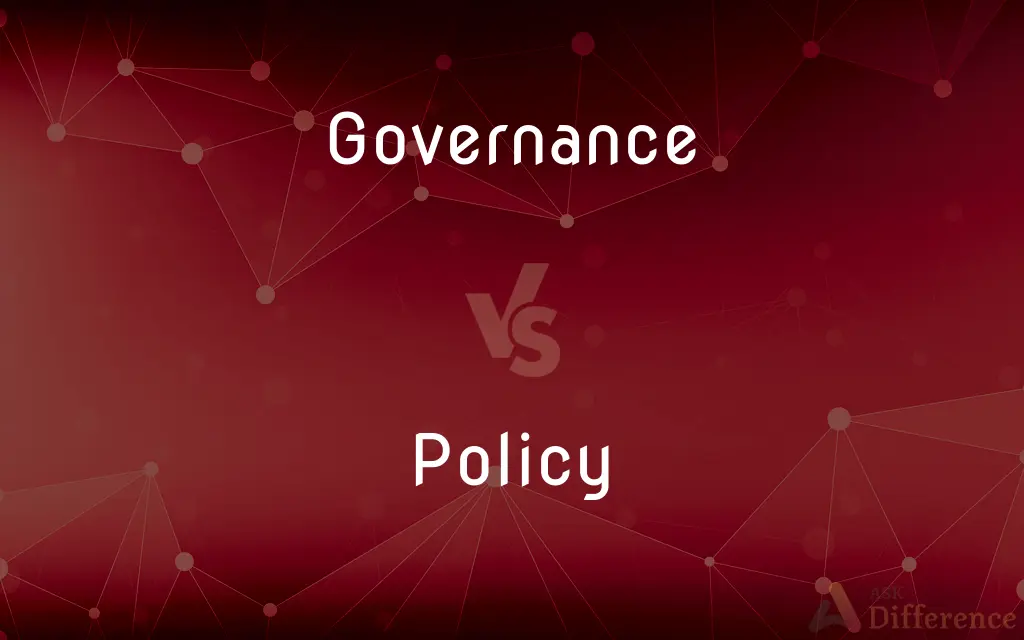Governance vs. Policy — What's the Difference?
By Tayyaba Rehman & Maham Liaqat — Updated on March 24, 2024
Governance is the structures, processes, and practices used to make decisions, direct activities, and ensure accountability. Policy, on the other hand, is a set of guidelines or rules that inform decisions and actions within an organization or system.

Difference Between Governance and Policy
Table of Contents
ADVERTISEMENT
Key Differences
Governance encompasses the overarching framework within which decisions are made and actions are taken in organizations, governments, or any structured group. It includes the roles, responsibilities, and procedures that define how power is exercised and controlled. Policies are specific directives or regulations that stem from this governance framework, guiding day-to-day operations and decision-making processes.
In the context of governance, the focus is on who has the authority to make decisions, how these decisions are made, and how those in governance roles are held accountable. For instance, corporate governance involves boards of directors, executive management teams, and the policies and practices they use to steer the company. Policies, however, are more about the "what" and "how" – what rules need to be followed, and how activities should be conducted to align with the organization’s objectives, legal requirements, and ethical standards.
Governance structures are designed to ensure that the right people have the right decision-making authority and that there is a balance of power to prevent misuse or abuse. Policies are developed within these structures to provide clear, actionable guidelines for all members of the organization to follow, ensuring consistency and compliance with both internal and external standards.
While governance is more abstract, encompassing the system of rules, beliefs, values, and institutions that define a mode of operation, policy is concrete, offering specific instructions or standards to be applied in particular situations. For example, a government's governance structure might include its constitution, branches of government, and electoral systems, while its policies could range from environmental regulations to education standards.
The effectiveness of governance is often measured by the organization's ability to achieve its goals, maintain compliance, and manage risk, while the effectiveness of policies is assessed based on their clarity, applicability, and the consistency of their enforcement. Both governance and policies are essential for the smooth, ethical, and efficient operation of any organization or system.
ADVERTISEMENT
Comparison Chart
Definition
Framework for decision-making and control
Specific guidelines or rules for conduct
Focus
Structures, processes, accountability
Guidelines, rules, standards
Scope
Overarching, system-wide
Specific, operational
Purpose
Ensure proper authority, decision-making, and balance of power
Guide decisions and actions according to objectives
Nature
Abstract, encompassing values and institutions
Concrete, providing clear instructions
Compare with Definitions
Governance
The system by which entities are directed and controlled.
The new governance model aimed to improve transparency and accountability.
Policy
A specific guideline or rule governing conduct or action.
The company's environmental policy mandates recycling and waste reduction.
Governance
Encompasses all aspects of directing, managing, and regulating an entity.
Good governance is essential for the success of any organization.
Policy
Provides a basis for consistent decision-making and practices.
The policy on customer service ensures a consistent experience for all clients.
Governance
Involves setting roles, responsibilities, and decision-making structures.
The governance structure was revised to better distribute decision-making power.
Policy
Designed to influence and determine decisions, procedures, and operations.
The new policy on data protection requires all employees to complete cybersecurity training.
Governance
Seeks to balance interests, manage risk, and ensure accountability.
Effective governance involves balancing the interests of all stakeholders.
Policy
Can be formal or informal, broad or specific.
The informal dress code policy allows for casual attire on Fridays.
Governance
Relates to the overall framework within which policies are made.
The organization's governance framework was designed to foster ethical decision-making.
Policy
A tool for implementing governance decisions.
The board's decision was implemented through a series of new operational policies.
Governance
Governance is all the processes of interaction be they through the laws, norms, power or language of an organized society over a social system (family, tribe, formal or informal organization, a territory or across territories). It is done by the government of a state, by a market, or by a network.
Policy
Policy is a deliberate system of principles to guide decisions and achieve rational outcomes. A policy is a statement of intent, and is implemented as a procedure or protocol.
Governance
The action, manner, or power of governing
Principles of good governance.
Policy
A course or principle of action adopted or proposed by an organization or individual
It is not company policy to dispense with our older workers
The government's controversial economic policies
Governance
The process, or the power, of governing; government or administration.
Policy
A contract of insurance
They took out a joint policy
Governance
The specific system by which a political system is ruled.
Policy
An illegal lottery or numbers game
He swore that he had never played policy in his life
Governance
The group of people who make up an administrative body.
Policy
A plan or course of action, as of a government, political party, or business, intended to influence and determine decisions, actions, and other matters
American foreign policy.
The company's personnel policy.
Governance
The state of being governed.
Policy
A course of action, guiding principle, or procedure considered expedient, prudent, or advantageous
Honesty is the best policy.
Governance
(management) Accountability for consistent, cohesive policies, processes and decision rights.
Policy
Prudence, shrewdness, or sagacity in practical matters
It is never good policy to speak rashly.
Governance
Exercise of authority; control; government; arrangement.
Policy
A written contract or certificate of insurance.
Governance
The persons (or committees or departments etc.) who make up a body for the purpose of administering something;
He claims that the present administration is corrupt
The governance of an association is responsible to its members
He quickly became recognized as a member of the establishment
Policy
A numbers game.
Governance
The act of governing; exercising authority;
Regulations for the governing of state prisons
He had considerable experience of government
Policy
A principle of behaviour, conduct etc. thought to be desirable or necessary, especially as formally expressed by a government or other authoritative body.
The Communist Party has a policy of returning power to the workers.
It's company policy that all mobile phones are forbidden in meetings.
Policy
Wise or advantageous conduct; prudence, formerly also with connotations of craftiness.
Policy
Specifically, political shrewdness or (formerly) cunning; statecraft.
Policy
The grounds of a large country house.
Policy
(obsolete) The art of governance; political science.
Policy
(obsolete) A state; a polity.
Policy
(obsolete) A set political system; civil administration.
Policy
(obsolete) A trick; a stratagem.
Policy
(obsolete) Motive; object; inducement.
Policy
(law)
Policy
A contract of insurance.
Policy
A document containing or certifying this contract.
Your insurance policy covers fire and theft only.
Policy
(obsolete) An illegal daily lottery in late nineteenth and early twentieth century USA on numbers drawn from a lottery wheel (no plural)
Policy
A number pool lottery
Policy
(transitive) To regulate by laws; to reduce to order.
Policy
Civil polity.
Policy
The settled method by which the government and affairs of a nation are, or may be, administered; a system of public or official administration, as designed to promote the external or internal prosperity of a state.
Policy
The method by which any institution is administered; system of management; course.
Policy
Management or administration based on temporal or material interest, rather than on principles of equity or honor; hence, worldly wisdom; dexterity of management; cunning; stratagem.
Policy
Prudence or wisdom in the management of public and private affairs; wisdom; sagacity; wit.
The very policy of a hostess, finding his purse so far above his clothes, did detect him.
Policy
Motive; object; inducement.
What policy have you to bestow a benefit where it is counted an injury?
Policy
A ticket or warrant for money in the public funds.
Policy
The writing or instrument in which a contract of insurance is embodied; an instrument in writing containing the terms and conditions on which one party engages to indemnify another against loss arising from certain hazards, perils, or risks to which his person or property may be exposed. See Insurance.
Policy
A method of gambling by betting as to what numbers will be drawn in a lottery; as, to play policy.
Policy
To regulate by laws; to reduce to order.
Policy
A line of argument rationalizing the course of action of a government;
They debated the policy or impolicy of the proposed legislation
Policy
A plan of action adopted by an individual or social group;
It was a policy of retribution
A politician keeps changing his policies
Policy
Written contract or certificate of insurance;
You should have read the small print on your policy
Common Curiosities
Can a policy exist without governance?
While policies can be developed independently, effective and enforceable policies typically require a governance framework to ensure they are aligned with organizational goals and values and that there are mechanisms for their implementation and enforcement.
What is the difference between governance and policy?
Governance is the overarching framework that includes decision-making structures and accountability mechanisms, while policy consists of specific rules and guidelines developed within this framework to guide actions and decisions.
What role do policies play in governance?
Policies are tools for the practical implementation of governance decisions, helping to operationalize the strategic direction set by governance bodies and ensure that daily operations are aligned with overarching goals and principles.
What is an example of governance in a corporate setting?
In a corporate setting, governance might involve the board of directors, executive management, and the policies and procedures they establish to guide the company's operations and strategic direction.
Can governance and policy evolve over time?
Both governance and policy are dynamic and can evolve in response to internal changes, external pressures, legal requirements, and stakeholder expectations.
How does governance influence policy?
Governance structures and principles determine who has the authority to make policies, how these policies are developed and approved, and how they are monitored and enforced, thus directly influencing the creation and management of policies.
How can a policy be effective within an organization?
For a policy to be effective, it should be clearly communicated, align with organizational objectives and values, have mechanisms for enforcement and monitoring, and be regularly reviewed and updated as necessary.
What happens if there is a conflict between governance and policy?
Conflicts between governance and policy typically require a review of both the governance structures and the policies in question to ensure alignment and compliance with the organization's goals, legal requirements, and ethical standards.
How does governance affect organizational culture?
Governance sets the tone for organizational culture by establishing the values, ethics, and practices that guide behavior and decision-making, influencing how policies are developed and implemented.
How are changes in governance reflected in policy?
Changes in governance, such as shifts in leadership, restructuring, or updates to governance principles, often lead to revisions of existing policies or the development of new policies to reflect the new governance direction.
Share Your Discovery

Previous Comparison
Bromadiolone vs. Brodifacoum
Next Comparison
Bother vs. DisturbAuthor Spotlight
Written by
Tayyaba RehmanTayyaba Rehman is a distinguished writer, currently serving as a primary contributor to askdifference.com. As a researcher in semantics and etymology, Tayyaba's passion for the complexity of languages and their distinctions has found a perfect home on the platform. Tayyaba delves into the intricacies of language, distinguishing between commonly confused words and phrases, thereby providing clarity for readers worldwide.
Co-written by
Maham Liaqat















































